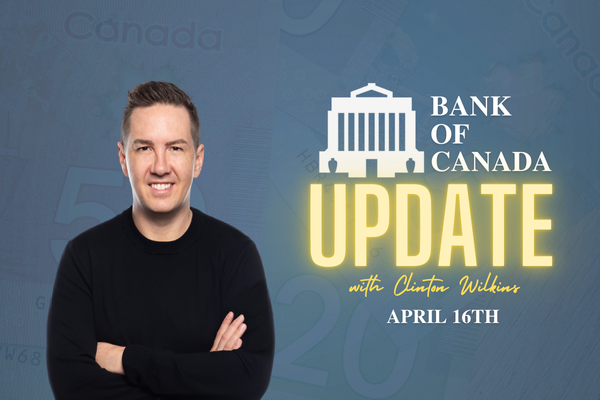On 95.7 News Radio, Clinton and Todd discussed the importance of credit monitoring due to rising fraud and data breaches.

CityNews Update – Can’t Afford A Home? Get Creative! | September 5th, 2023
Clinton Wilkins joins Todd Veinotte on CityNews to discuss the alternative and creative ways people are currently affording homes. They talk about “What if?” scenarios, the increase in co-singers and large family gifts, the concerns surrounding new construction and Clinton’s Bank of Canada predictions.
Todd Veinotte 00:00
Alright. So we know that housing and getting a mortgage is becoming more challenging with interest rates on the rise and with rising housing prices. As well, I saw a story recently on the global news website as rising interest rates are boxing many individual buyers out of Canada’s housing market. Some say in a new report that Canadians are increasingly teaming up with family and friends, just to afford a home. Joining me to talk about this is Clinton Wilkins, who’s our mortgage guru and Clinton, you and I have talked about this, you are ahead of the curve on this, you were talking about this month ago.
Creative approaches to owning a home
Clinton Wilkins 00:35
Oh, we’ve been talking about this for a while Todd. And you know what it’s becoming more and more common, because in Halifax, our average house price is somewhere around $500,000. We’ll use that as an average average number. And to qualify for a home at that rate. Typically, we need household income of about $125,000. So a lot of single people, they can’t do it on their own. And we’re seeing a lot of more creative ways that people are trying to approach this problem. And you know, still Canadians have this dream of homeownership, and homeownership is still available for a lot of people. But people had become more creative. So we’re seeing, you know, some scenarios where there’s three people buying a home together. Sometimes there’s four people buying a home together. I actually had a scenario not very long ago, where three people bought a duplex together, it was a couple and a plus one. And you know, they bought a two unit, they knew it wasn’t forever. But they were really planful about it, you know, they sought legal advice about how to set up the deed, because there’s two ways in Nova Scotia that we can take the deed. You can do tenants in common or joint tenants and they have very different legal implications. So I think it’s really important to talk about things like this going into it. And they all did, like a pseudo cohabitation agreement. So they really got their financial numbers down on paper, they knew what the exit strategy was. You know, if one or all the relationships that are breaking down. and I think that is important. You know, it’s all great to, you know, want the thing and do the thing, and, and, you know, take the action in terms of buying a home. But I think that you need to sometimes look at the bigger picture. And I think you need to get advice from professionals.
“What if?” scenarios with joint tenants
Todd Veinotte 02:03
What are some of the potential pitfalls with something like this?
Clinton Wilkins 02:08
Well, you know, if it’s joint tenants, if someone were to pass away, the deed would just automatically go to the other person. So I mean, that that’s one thing. But in many scenarios, where there’s multiple buyers, buying a property, they’re doing tenants in common. So sometimes we consider that, you know, different percentages of homeownership. So, you know, we’ve certainly seen scenarios where maybe a young couple, buy a home and apparent cosines, and they do tenancy in common, and it’s like 99% for this pair, and 1% for the other. So really, they’re on there just for the sole fact of financing. But you know, we’ve certainly seeing a lot of matrimonial breakdown, or you know, couples breaking up. And I think that’s certainly a risk. And I think the other risk is if somebody does pass away, what are the estate obligations in terms of this real property?
Todd Veinotte 02:54
Can that be worked out, though, through through the legal framework?
Clinton Wilkins 02:58
Yeah you can certainly work it out through a, you know, a will obviously wills are very, very important. And I think depending on how you have the deed set up, sometimes you can automatically, you know, grant, the other person, the deed. So I think, looking at a will and looking at how the deed is going to be set up. I think that’s certainly important if you’re worried about things like estate issues. And you know, when we’re talking about things like matrimonial breakdown or you know, couples breaking up, you know, getting a cohabitation agreement in place, I think is important. Obviously, if you are married and it is your matrimonial property act or your matrimonial property, that certainly has an impact because the matrimonial Property Act here in Nova Scotia, certainly, will govern that as well.
Co-signers and large family gifts are increasing
Todd Veinotte 03:40
And of course, not everybody has to live in the home, or do they?
Clinton Wilkins 03:43
No they don’t. So we certainly see lots of scenarios where we’ll see a co-signer, co-signers are the most common and sometimes in rare cases, a guarantor may be on the mortgage and not even on the title the property Todd. So that really does happen. You know, sometimes we see you know, parents coming in with their younger adult children. And you know, they want to guarantee the mortgage or something like that and being a guarantor. Certainly not as common taught as maybe it was one you know, once was. Usually lenders want the borrower to be on the title of the property, because then they have a little bit more skin in the game. And it’s really important when it comes to things like, you know, collection, or you know, if they have to serve them legal documents, if they’re on title, it’s a lot easier to maybe track them down. But certainly the borrower’s do not need to live in the property. But, you know, to be honest with you, I’m seeing a lot of larger family gifts and sometimes that’s a great way to you know, mitigate that risk of co-signing for your adult child. I know that’s not possible for everyone, Todd, but we certainly see a lot of young first time homebuyers coming in with six figure gifts from mother, father, brother, sister in that type of family orientation. And the reason that we’re seeing a lot of gifts and I’ve heard this directly from the parents. It’s because they said, we have benefited from our property increasing in value. And the only way that we’re going to get these kids into a home, maybe now, or ever is going to be gifting them basically a piece of the equity. So we’re seeing some of the parents even coming into us for mortgage finance.
Todd Veinotte 05:15
Alright, so over the last number of years, and you’ve been in this business for a long, long time, are you seeing more, is the frequency of this type of dynamic, it’s increasing from what I’m gathering here?
Clinton Wilkins 05:25
100%, it’s increasing. I think people are becoming more creative. I think it’s just the nature of what’s happened with the increases in the prices. And, you know, in Halifax, we’ve never really had the boom, and the prices tied, obviously, we’ve had a lot of price increases over the last two and three years. But our market is certainly more stable than in many other areas of the country, I can tell you, I talk to colleagues in Ontario and Alberta and BC, all the time, and they’re in dire straits in terms of what’s happened with their property values. And people just can’t qualify to get into the property ladder at all, just due to the price point. So yeah we’re feeling some of this pain here. But people are still transacting every day. And I think our market is becoming more balanced. You know, we still need much more inventory to, you know, satisfy the amount of demand that we have just due to, you know, our population growing. So we definitely need more homes for sale, and we need more construction. But it’s certainly a very much more balanced market than in the rest of the country.
Delays are the biggest concern for new construction
Todd Veinotte 06:21
Right. Home construction, though, is that I had a story last week I read a story last week where it’s it can be dicey to invest in a new property, into a new home, just the way that the financing works. And you and I’ve talked about this on our show, of course, Mortgage 101. So what’s your advice to people, if they are potentially looking at a new home route?
Clinton Wilkins 06:43
I think sometimes people think like new and shiny is going to be you know, without problems, it’s like buying a new car, you’re driving it off the lot, it should be good for a few years. With new home construction is not always the same type of scenario. Usually, what I tell buyers is if you can buy a resale home, someone else has already worked out the problems, you don’t have to worry about construction liens, you don’t have to worry about the you know, as much the quality of the construction, because it’s kind of tried and tested, right? With new construction, I think the biggest concern right now, obviously is delays in terms of getting it complete. And some builders are just not meeting their obligations under the you know, the contract. Sometimes in these new home construction contracts, they’re also now putting in clauses around inflation, and increasing the the construction price or the purchase price of the home just because of what’s happening with inflation. So I think that’s something that you really need to think about. And sometimes the timeframe for construction is just very prohibitive for people. Normally, when we can guarantee an interest rate, we’re getting it locked in 120 days before that mortgage was to fund. But with new home construction, sometimes the construction can take one to two years plus sometimes just depending on what type of property that’s being built. And who knows what’s going to happen with interest rates. I’m optimistic that we’re now more on a plateau situation. But I think everyone can agree, interest rates across the board are high.
Todd Veinotte 08:02
Alright, so you mentioned inflationary cost might go up, therefore, the builder could potentially charge more. What’s the burden of proof for that, though, because some might have concerns that a builder could just simply say, we have to increase your price. How much do they have to do prove to justify that increase?
Clinton Wilkins 08:20
I don’t know what they need to do to actually meet that burden of proof. But I can tell you, everyone can agree that we’re in an inflation situation. Obviously, the inflation has slowed since the Bank of Canada has started increasing interest rates, you know, 12 and 18 months ago, but inflation is still a real thing. And we don’t know what’s going to happen in another three to six months, we didn’t think we were going to be in the situation that we’re at now. But I’m optimistic that inflation has slowed. So I think hopefully, that’ll be less of a concern. But I can tell you, there’s certainly builders that have lost their shirts, Todd, and some of these builders have, you know, been able to make good on their contracts. But some have had to either terminate the contracts altogether, or really had to slow the delivery of that final product, just due to the cost of materials and also the cost of labour.
The first steps in the process of buying a home
Todd Veinotte 09:07
Absolutely. So again, if people are looking at this, and there may be perhaps people listening right now, I hadn’t thought of that. So yeah. And then they might have friends or whatever it might be who they feel they might want to pool their resources together with what’s a good starting point for people?
Clinton Wilkins 09:24
Well, I think having the conversation first and just figuring out, okay, how does everyone’s income look? How does everyone’s credit look? How are the assets? Do you have the money together for the down payment? And then figure out really what your budget is going to be. I think the very first step is getting a pre-approval. So I think going and seeking the advice of an unbiased mortgage professional, I think is going to be key, especially in a situation like this. Bring everyone in together, get all the you know, laundry laid out on the table, and then really figure out what the best next path is forward. Once you have the pre-approval in place, then you’re going to want to seek the advice of a realtor and figure out really what’s going to make sense what type of home is going to work for this type of, you know, housing unit, and then go from there. I can tell you there certainly are properties for sale, Todd, we’re doing transactions every single day. And people are certainly becoming more creative. So if you’re a first-time homebuyer, it’s a great way to enter that real estate market and really another real estate ladder. And maybe it’s not a forever plan, but maybe this is the plan for the next five years, or something like that. And then in that next, you know, and then maybe at that five year mark, then maybe everyone agrees together, the property is gonna be sold, or maybe one person is going to buy it out, and then move forward. It’s a good way to enter the market. And I certainly think we’re going to see more of that in the years to come.
Todd Veinotte 10:36
Okay and Bank of Canada and its interest rate announcement tomorrow. So you’ll be on again after that. Your foreshadowing prediction? What do you have for us on that?
Clinton’s Bank of Canada Predictions
Clinton Wilkins 10:45
I’m going to put up a poll here on Twitter once we’re done so you can check it out at Clinton Wilkins, I’m on Twitter. I’m going to predict a hold. Just due to what’s going on with inflation, I think probably people that are in a variable rate mortgage, have a home equity line of credit or any liabilities tied to the prime rate that’s obviously impacted by the key overnight rate. That will be Music To everyone’s ears. I’m gonna predict a hold. I think some economists think that there may be another increase, maybe down the road, depending on what happens with inflation. We’ll see tomorrow, the Bank of Canada will be doing their key overnight rate announcement at 11am our time, I’ll announce it live like on our social media, and then we’ll be on with you tomorrow, shortly after lunch.
Todd Veinotte 11:28
Okay, Clinton, great stuff. Thank you so much my friend.
Todd Veinotte 11:31
Thanks for having me, Todd. Alright. Take care. Clinton Wilkins our mortgage guru.


